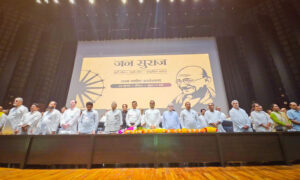By Aparna Singh
The idea of availability of need-based loans at an interest rate lower than from available informal sources is a blessing in disguise for any community. The idea of need-based loan for women of the family germinated from the fact that they are the real drivers of economic growth and by empowering them you empower the whole community. This innovative idea was promoted by RojiRoti, UK and was implemented by a local NGO CPSL in Patna district of Bihar. I had the privilege to interact with them closely and learnt that this type of loan leads to financial inclusion of the marginalized section of the population who do not have access to the formal banking sector for smaller amounts. It works in two ways – as a driver of social transformation and by empowering its members economically, especially women. The idea was appealing to most as:
– The organization charged a lower rate of interest compared to other informal sources which was interesting for the community
– They provided need-based loans
– loans for productive as well as non-productive activities such as wedding and funeral
– They proposed a saving scheme wherein the members can save a minimum of Rs10/week and the return on the savings was shared between the organization and the individual members
As I learnt further, the idea of the loan is usually spread by a proactive member of the village like an anganwadi worker (AWW) or a school attendant. The villagers appreciated the opportunity for an easy and convenient loan and supported the women of the family to join the group. Being a woman was the only criteria to join this SHG. These members did not require any identification proof or identity verification at the time of joining. However, the operating principles were dictated by the agency and members having no experience decided to follow these norms. There was no clarity on source of money for the members but this kind of loan surely inculcated a sense of achievement for these women. Women in rural India are treated as mere household workers. In this process, they forget that their needs are as equally important as anybody else’ needs. This scheme gave them the privilege to co-share financial responsibility with their partners.
Parallelly, it instilled a sense of confidence in the women. They could contribute to renovating a leaking roof of the house which was used to run the family business of tailoring or help in increasing the productive learning hours of their children. I also spoke to a 10-year-old SHG and their level of confidence was overwhelming. Within this group, there were two women who mentioned accessing a loan for themselves. One of them talked about going on a pilgrimage with her mother and another spoke of buying a silver ornament (ankle wear) with the loan amount. It is subjective whether it was ethical or not but it did empower these women to borrow money to fulfill their needs.
The members feel that the organization is doing a noble task of helping the poor and marginalized at the time of need such as a child’s education, healthcare, wedding, funeral and/ or repayment of other loans. The organization has fulfilled its task of granting a loan to the needy at the time of the crisis. A spark for accomplishment has been ignited within these women though they fail to recognize it. The inherent desires as a mother, a wife or a daughter-in-law to fulfill her personal and worldly aspirations are coming to the surface but they need uplift in their confidence level. It is a pat on the back of RojiRoti. Take a bow.
Aparna Singh is a graduate in Economics and currently working in the philanthropic arm of Philips Lighting, Amsterdam. She is passionate towards international development and interventions in developing economies by public, private and governmental organizations.
Views are personal.


















